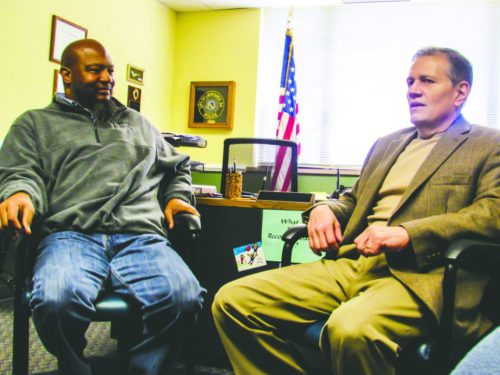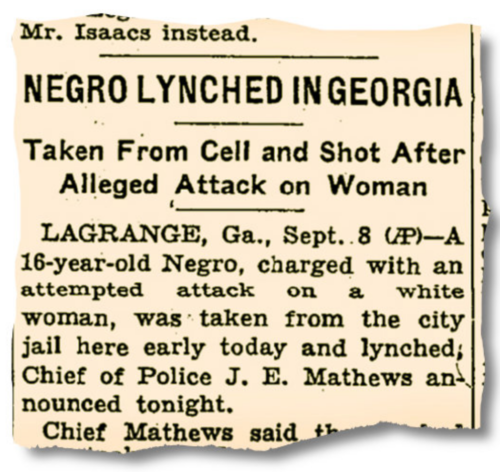Georgia Police Chief, Other White Leaders Apologize for 1940 Lynching
Share
Breaking News!
Today's news and culture by Black and other reporters in the Black and mainstream media.
Ways to Support ABHM?
Griot: Karen Branan

Ernest Ward, president of the Troup County NAACP, (left) and LaGrange Police Chief Louis Dekmar have organized an event of acknowledgement in the 1940’s kidnapping and murder of Austin Callaway, 18. (Photo By: Melanie Ruberti | LaGrange Daily News)
On January 26, 2017 the police chief of Lagrange, Georgia, along with the city's mayor, a judge, and a college president, representing the white business community, issued an apology for the 1940 lynching of teenaged Austin Callaway. The apology was issued to NAACP Pres. Ernest Ward and to members of Callaway’s family. Special mention was made of the church’s minister Rev. W.L. Strickland, who took his own life in his hands when he not only spoke out to a silent city against the lynching but wrote Thurgood Marshall, then legal counsel for the national NAACP for help, and started the Lagrange NAACP chapter.
On March 18, 2017, a local citizens organization, Troup Together, assisted by the Equal Justice Initiative of Montgomery, AL, will place a memorial marker to Callaway and other African Americans lynched in that county at Vernon Memorial.

A Sept. 9, 1940, article in The New York Times about the lynching of Austin Callaway. The fatal cruelties inflicted upon him are to be acknowledged Thursday evening. (The New York Times)
Before the Lagrange apology only one public official, the mayor of Waco, Texas, has taken responsibility for a lynching in his jurisdiction. Never has a police chief done so. In Lagrange, Chief Lou Dekmar said, "Most lynchings would not have happened if the police had done their jobs." Officials who spoke emphasized their determination to work for improved race relations on all levels. The service was covered by the New York Times, CBS, NBC, CNN, and NPR.
Karen Branan is the author of The Family Tree: A Lynching in Georgia, A Legacy of Secrets, and My Search for the Truth. She has been involved with the Lagrange effort for over a year. The lynchings detailed in her book occurred just 20 miles from that of Austin Callaway.
At ABHM's Founder's Day for Racial Repair and Reconciliation 2017, Karen will present about how her discoveries about her family's complicity in a lynching unleashed her anti-racism activism.









Comments Are Welcome
Note: We moderate submissions in order to create a space for meaningful dialogue, a space where museum visitors – adults and youth –– can exchange informed, thoughtful, and relevant comments that add value to our exhibits.
Racial slurs, personal attacks, obscenity, profanity, and SHOUTING do not meet the above standard. Such comments are posted in the exhibit Hateful Speech. Commercial promotions, impersonations, and incoherent comments likewise fail to meet our goals, so will not be posted. Submissions longer than 120 words will be shortened.
See our full Comments Policy here.